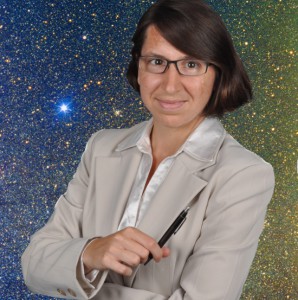

… is an astronomer (and historian of astronomy) from Berlin, Europe. She has been working as scientific staff at universities & freelancing independent scholar in planetariums and museums.
Expertise/ Research Outcomes
- Linked the Origins of Babylonian Constellations with general concepts of Cultural Astronomy (2024)
- History of celestial globes and star catalogues
- Reconstruction of historical constellations (since 2014)
- planetarium software development (since 2018)
- planetarium education development (since 1998)
- MUL.APIN, the Babylonian Compendium of Astronomy
- Hipparchus’s Celestial Globe and Star Catalogue (dissertation)
- Reconstruction of Hipparchus’s Globe
- Babylonian predecessors of Hipparchus
- Babylonian mathematical astronomy & astral science
- Greek mathematical astronomy & astral science
- History of Telescopes (in particular a study on the world’s biggest brachymedial telescope)
- Education of Einstein’s Relativity Theory
- Gravitational Lensing
Education/ Academic Background
- history of science (specilized in astronomy)
- physics (specialized in astronomy)
- education (teacher education, edutainment, science journalism)
Activities / positions of honour
- engaged in the International Astronomical Union,
- Working Group on Star Names
- Office for Astronomical Outreach
- Commission C5
- data curator for constellations in the Stellarium team
- member of board: Journal of Astronomical History and Heritage (based in China)
- member of board: CAP-Journal (based in Japan)
- member of board: Journal of Skyscape Archaeology (based in the UK)
- collaborator of State Museum for Prehistory Halle (Germany)
Research in astronomy
Methods:
- data-driven history of exact science
- applied historical astronomy
- computational history
- data management / data curation
Main Topic: celestial globes and maps
- consisting of
- astrometry/ cartography
- technology
- mathematics of measurements
- astrometrical frames of reference, e.g.
- coordinate systems and their historical development
- constellations (as frame of reference, as cultural calendar)
- stars
- their cultural history/ names,
- their physics/ variabilities/ (exo)planets/
- novae, supernovae and all types of eruptions
- astrometry/ cartography
- modelling: planetarium (software) and data management
Further Research Topics
- gravity
- Newton
- Einstein’s general relativity
- microlensing
- optics
- telescopes and their historical development
- planetariums and their historical development
- basical concepts (history of optics: from antiquity to the present)
- time